Happy Holidays (2024) & New Year from Lifeway Mobility

Watch the Lifeway Mobility 2024 "Happy Holidays" Video:

Watch the Lifeway Mobility 2024 "Happy Holidays" Video:

“It’s the most wonderful time of the year!” The holiday season is officially here, bringing lots of joy and cheer to families and friends gathering for holiday events and parties
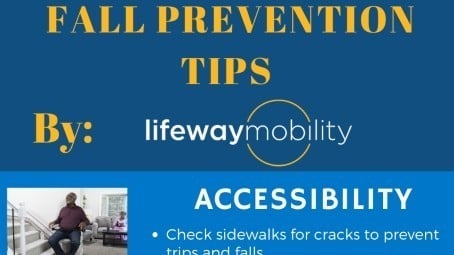
As we age, our home may not be as easy to navigate as it was years ago. Getting up and down a set of stairs may be a chore because of decline in mobility or weaker muscles. The risk of slipping and falling in the bathroom may be much higher, especially if there are no grab bars in the bathtub/shower, or near the toilet. An option for older adults that are having a difficult time getting around at home is a senior/assisted living facility. However, these types of facilities do not offer the familiarity and comfort that a home does. A home is full of memories from holidays and gatherings with family and lifelong friends.
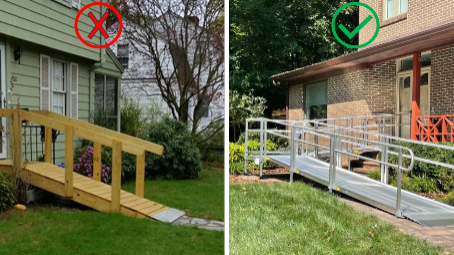
Our home accessibility experts are invited into our client’s homes and into our local communities to evaluate for home accessibility solutions, such as stair lifts or wheelchair ramps or lifts. During our evaluations, we often encounter modifications that were done by another company or DIYs that do not meet ADA requirements, or are unsafe.
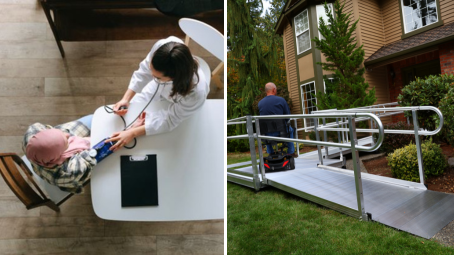
People diagnosed with cancer often require additional safety precautions to ensure that any health-related problems do not occur. Day-to-day activities that can be taken for granted will become harder. Simple things like cooking, cleaning, and even walking up the stairs may become strenuous, and even dangerous.
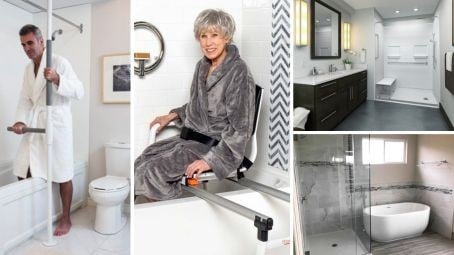
Falls are a hazard that the elderly and people with mobility issues face every day – and the majority of falls happen in the bathroom. In fact, the Centers for Disease Control and Prevention (CDC) has declared the bathroom the most dangerous room in the house for older adults.
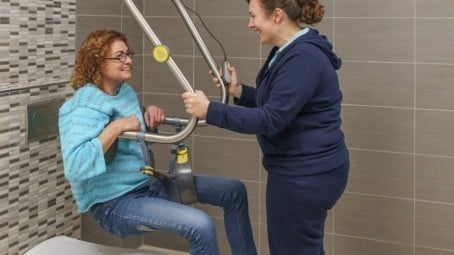
A ceiling lift can be a great alternative to an accessible bathroom remodel when budget is limited. Any sort of bathroom remodeling involves permits, construction, and can cost tens of thousands of dollars.
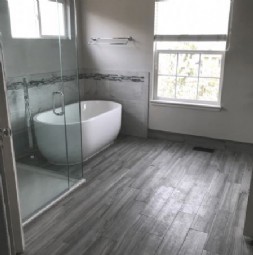
A complete bathroom remodel is anything but a small project. Whether you are choosing to upgrade your bathroom for aesthetic reasons or to increase your home’s value, there are some crucial elements you should consider before you bring your project to life! Functionality should be at the center of your remodel but creating a functional bathroom no longer means you have to sacrifice style and features. Designing the bathroom of your dreams in your master suite or updating the guest bath to serve a variety of purposes is easy with a little inspiration and a great design team.
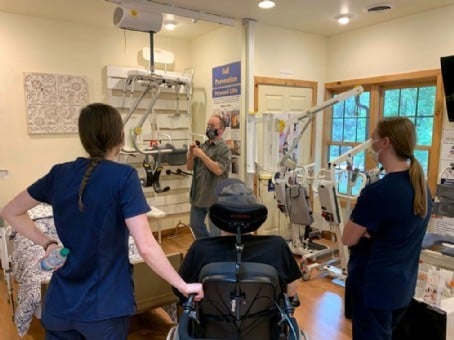
Dale is wheelchair bound and will soon be discharged from the hospital. He doesn’t have a lot of support at home, and because of his disability, his immediate concern was not being able to get his pants up on his own after toileting. Accompanied by his OT, Whitney of Spalding Rebah PSL, and her OTA student, they toured the Lifeway Mobility showroom in Denver and explored various bathroom accessibility solutions. Below are 4 steps Dale & his OT followed that can help make toileting graceful and independent for older adults and those with disabilities. 1. Toileting Height Customizing your toilet height is step one of toileting for anyone with mobility challenges. If you are standing and sitting, the height of the toilet is very important. The most common toilet height is 13 inches, but a taller toilet can make standing up and sitting down so much easier. Newer toilets are ADA height or 15-16 inches. Also, you can add a porcelain insert called a toilevator underneath the toilet (red arrow in image above) to add 3.5 inches more or add a elevated toilet seat for 5 more inches. A bidet is another option that can added for easy cleaning, warm water, warm seat, and other luxuries. Bidets can replace the seat on any toilet. They do not need a second seat or a transfer and do not require a power outlet close to the toilet. 2. Shower Chair or ShowerBuddy A second step to make toileting an art, is consider a bath or shower chair that rolls over the toilet. These types of products are made at the correct seat height to roll over the toilet, and eliminate the transfer to the toilet. In the seat is a cutout so that you don't have to move from the rolling chair. These chairs can also roll in to the shower for bathing and cleaning. The ShowerBuddy has the advantage of connecting to a bathtub or shower and allow the seat of the chair to slide into the tub or shower. 3. Overhead Ceiling Lift During the visit, Dale was educated on the SureHands ceiling lift with the Body Support system. This overhead lift setup is great because it grips in just the right places when lifting: Under the thighs and under the arms. It mimics the arms placement and gentle lift provided by a caregiver. Best part is that it can be operated independently. The OT demonstrated the use of the ceiling lift from a bed while Dale looked on. It was then Dale’s turn to test the SureHands ceiling lift out, from his wheelchair. This required some extra hands during the initial trial run, which is common. A sling variation was then attached to the ceiling lift. The goal was to find the best solution that would help Dale toilet independently, while remaining comfortable and painless. 4. Bedside Commode Most health care professional will recommend a bedside commode, which is like having a plastic toilet in your bedroom. Bedside commodes are helpful but typically a last resort. A bedside commode is made of a steel or plastic frame with a bucket under the toilet seat. Art of Toileting Summary In all, the show home tour, the education about the various toileting solutions, ceiling lift systems, and the actual trial runs took the group just over one hour. The end result? Dale found his ideal body lift and transfer solution and left with a smile under his mask, and newfound reassurance that he’ll be okay on his own once he gets home from the hospital.
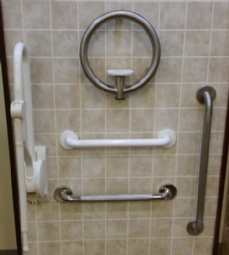
For seniors and those with limited mobility, grab bars can be a lifesaver. There are many types of grab bars that can be added throughout different rooms in a home to provide stability for people who have trouble walking. The bathroom is often the room that makes the most sense for the installation of a grab bar because it is the most dangerous room in a house for seniors or those with limited mobility. In fact, falls in the bathroom due to a wet, slippery floor is one of the top causes of injuries for elderly men and women. Whether it's the barrier that makes it difficult to get in and out of a tub or shower or a toilet that is tough to get off of, the bathroom definitely presents its challenges.
Stepping over the edge of the bathtub wall can prove dangerous for many elderly and disabled people. Create step-in access to your tub/shower with a tub cut out, a low-cost tub-to-shower conversion solution that will provide step-in accessibility to your existing bathtub.
At some point, due to age or disability, you or a loved one may be faced with the prospect of having to use a wheelchair to assist in your primary mobility at home. Whether it be a temporary fixture to your home or something that will be more permanent, there are a number of simple modifications that can help improve accessibility and make life easier. If you are like most people, you live in a home that was not designed to accommodate wheelchairs. Below are some simple ideas on how to make sure that you will be able to stay in your home despite the necessity of a wheelchair.